Java Extensible IO
Doug Lee
outline
- Extensible Network Services
- event driven
- Reactor mode
- Basic Edition
- Multithreaded version
- Other Variations
- Overview of blocking IO API s in java.io packages
Network Application Server
- Web server, distributed object system, etc.
- Their common features
- Read Request
- Decode Request Message
- Business Processing
- Coded response message
- Send response
- Different steps in practical application
- XML parsing
- file transfer
- Dynamic Web Page Generation
- Computational Services
Classic Service Design
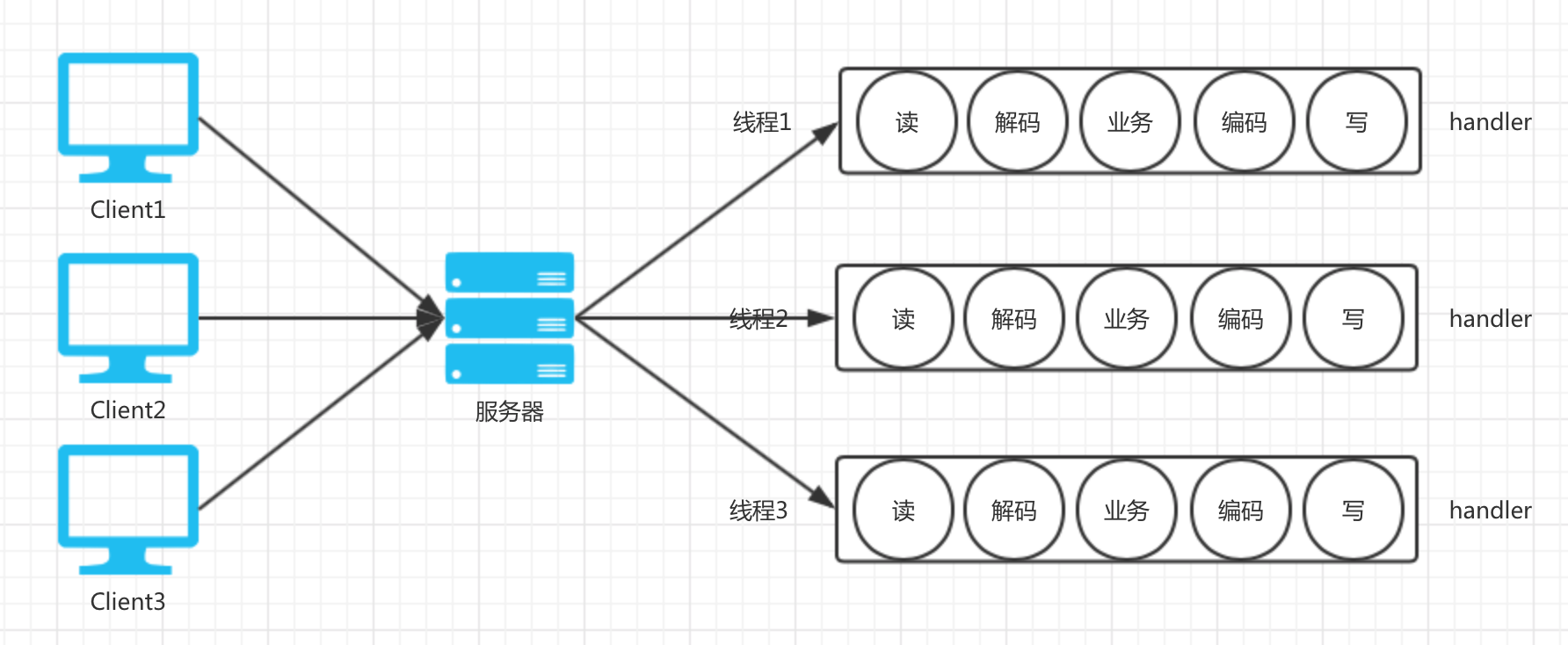
Run one handler per thread
Classic ServerSocket listening loop
class Server implements Runnable { public void run() { try { ServerSocket ss = new ServerSocket(PORT); while (!Thread.interrupted()) new Thread(new Handler(ss.accept())).start(); // Use a single thread or thread pool here } catch (IOException ex) { /* ... */ } } static class Handler implements Runnable { final Socket socket; Handler(Socket s) { socket = s; } public void run() { try { byte[] input = new byte[MAX_INPUT]; socket.getInputStream().read(input); byte[] output = process(input); socket.getOutputStream().write(output); } catch (IOException ex) { /* ... */ } } private byte[] process(byte[] cmd) { /* ... */ } } }
Note: Exception handling omission
High scalability goals
- Decrease in service elegance as pressure keeps increasing (more clients)
- Performance continues to increase as resources (CPU, memory, disk, bandwidth) increase
- Goals for high availability and performance
- Low latency
- Respond to peak requests
- Quality of Service Controllable
- Divide and conquer are common solutions to scalability problems
Divide and rule
- Divide the process into smaller tasks, each task being non-blocking
- The IO event model is usually a trigger mechanism when the task is ready to execute
- The java.nio package contains basic non-blocking mechanisms
- Non-blocking read and write
- Distributing tasks to associate tasks with IO event models
- More ideas
- Event Driven Design
Event Driven Design
- Event Driven Design
- Usually more efficient
- Less resources do not require a thread to be started for each client
- Reduce overhead, reduce context switching, and less lock competition
- Event distribution is slow and action and time must be bound together
- Higher programming difficulty
- The process must be split into a series of non-blocking task units
- Similar to the GUI event model
- Not all blockages can be removed, such as GC, memory page errors, etc.
- Attention must be paid to changes in the state of the service
- The process must be split into a series of non-blocking task units
Event Driver for Java AWT Graphic Programming
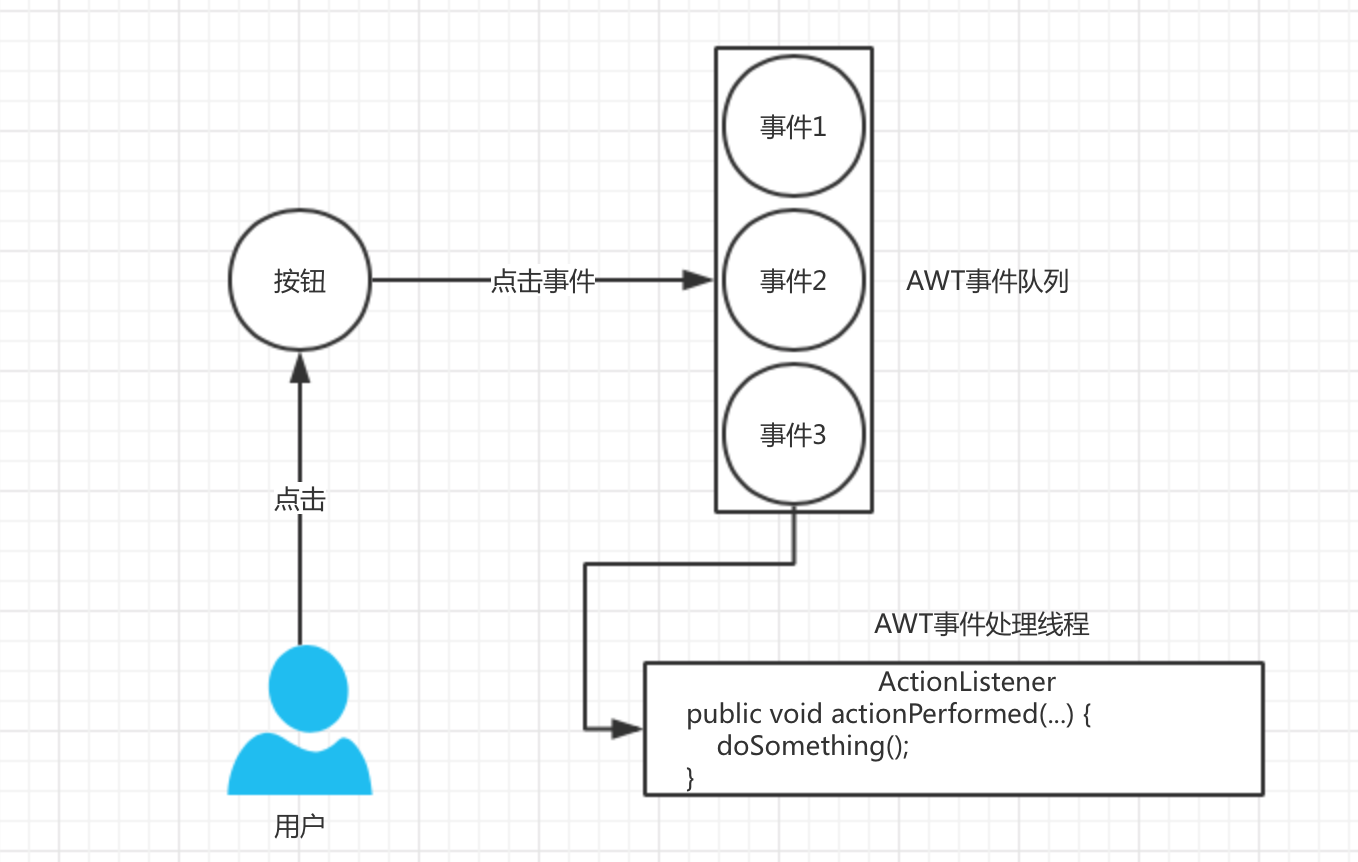
Event-driven IO models are similar, but design is continuous
Reactor model
- Reacttor is responsible for distributing events to the corresponding handler, similar to an AWT thread
- Handlers are non-blocking tasks, similar to ActionListeners in AWT
- Manage is responsible for binding handler s to events
- See Pattern-Oriented Software Architecture Volume 2 by Schmidt et al. And Richard Stevens about the number of networks, MattWelsh's SEDA framework, and so on
Reactor Basic
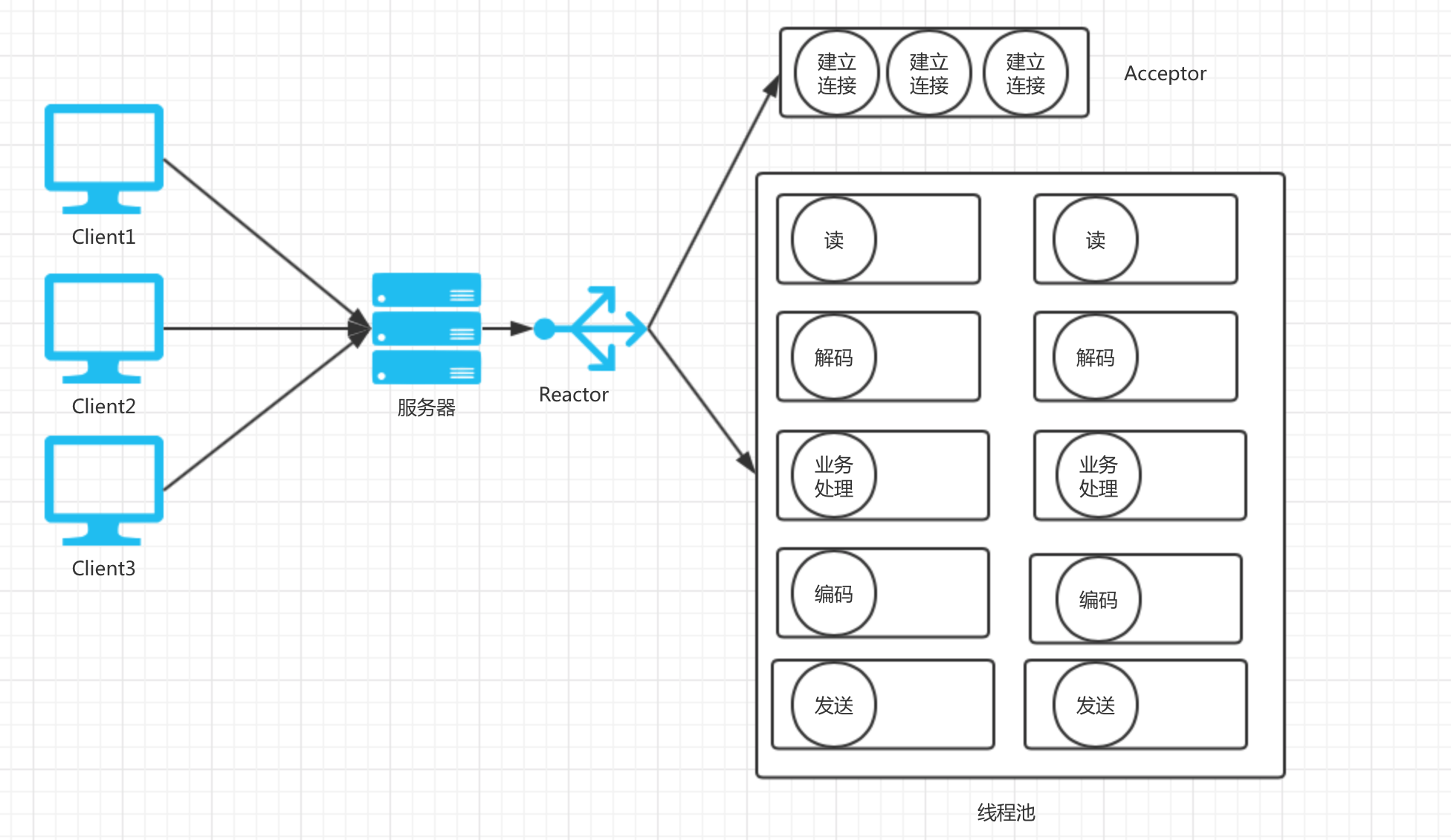
Single Thread Edition
Support provided by java.nio
-
Channels
>Channels are connections between files and socket s, supporting non-blocking reads
-
Buffers
>Array object, which can be read and written directly by Channel
- Selectors >Responsible for filtering those Channel IO events
- SelectionKeys >Save IO event state and bound objects
Reactor 1: Create
class Reactor implements Runnable { final Selector selector; final ServerSocketChannel serverSocket; Reactor(int port) throws IOException { selector = Selector.open(); serverSocket = ServerSocketChannel.open(); serverSocket.socket().bind( new InetSocketAddress(port) ); serverSocket.configureBlocking(false); SelectionKey sk = serverSocket.register( selector, SelectionKey.OP_ACCEPT ); sk.attach(new Acceptor()); } /* You can also use SPI provider s, more specifically: SelectorProvider p = SelectorProvider.provider(); selector = p.openSelector(); serverSocket = p.openServerSocketChannel(); */
Reactor 2: Distribution Cycle
public void run() { // Usually start a new thread try { while (!Thread.interrupted()) { selector.select(); Set selected = selector.selectedKeys(); Iterator it = selected.iterator(); while (it.hasNext()) dispatch((SelectionKey)(it.next()); selected.clear(); } } catch (IOException ex) { /* ... */ } } void dispatch(SelectionKey k) { Runnable r = (Runnable)(k.attachment()); if (r != null) r.run(); }
Reactor 3: Acceptor
class Acceptor implements Runnable { // Built-in class public void run() { try { SocketChannel c = serverSocket.accept(); if (c != null) new Handler(selector, c); } catch (IOException ex) { /* ... */ } } } }
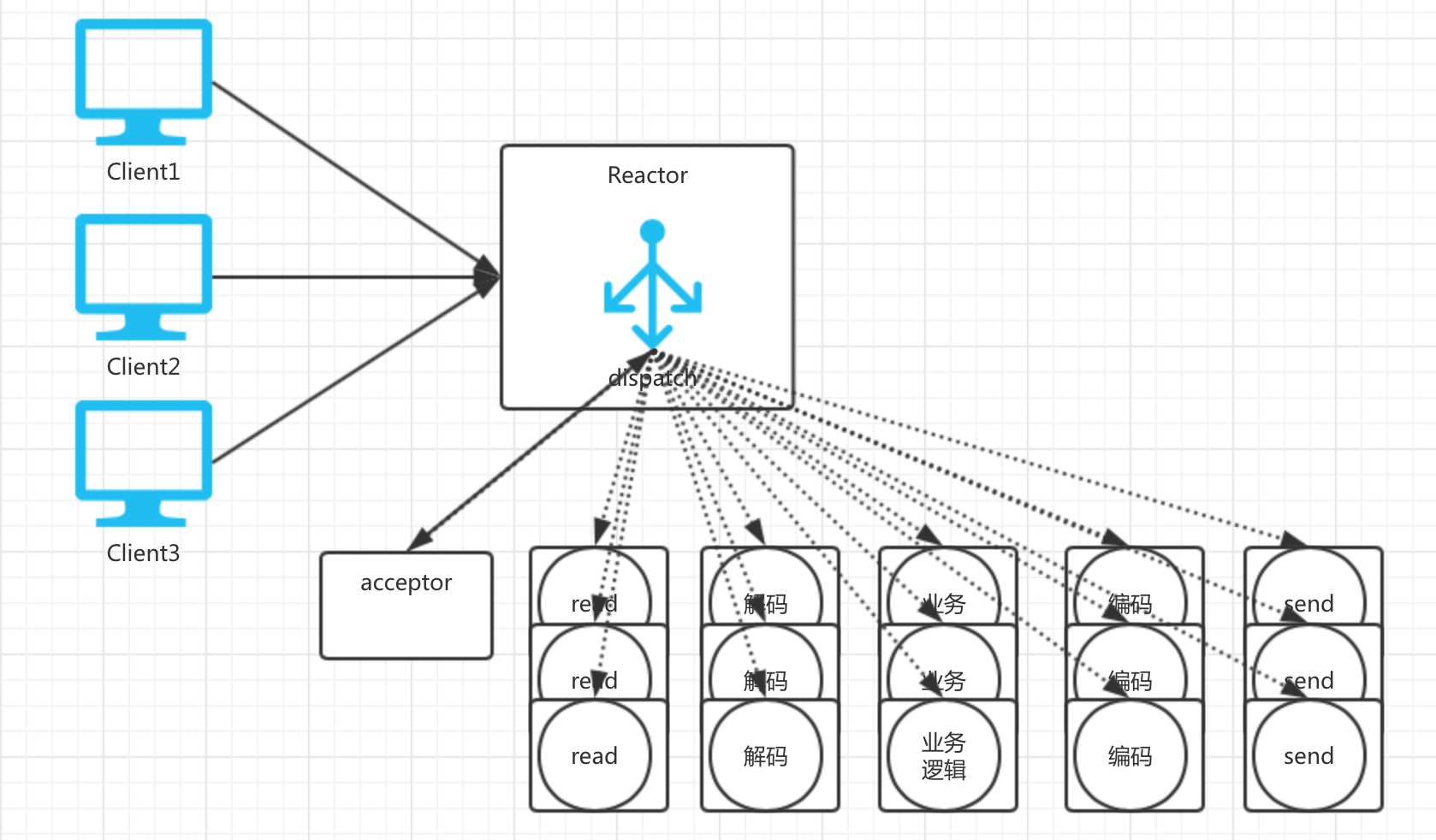
Reactor 4: Build Handler
final class Handler implements Runnable { final SocketChannel socket; final SelectionKey sk; ByteBuffer input = ByteBuffer.allocate(MAXIN); ByteBuffer output = ByteBuffer.allocate(MAXOUT); static final int READING = 0, SENDING = 1; int state = READING; Handler(Selector sel, SocketChannel c) throws IOException { socket = c; c.configureBlocking(false); // Attempt to listen for events sk = socket.register(sel, 0); sk.attach(this); sk.interestOps(SelectionKey.OP_READ); sel.wakeup(); } boolean inputIsComplete() { /* ... */ } boolean outputIsComplete() { /* ... */ } void process() { /* ... */ }
Reactor 5: Processing requests
public void run() { try { if (state == READING) read(); else if (state == SENDING) send(); } catch (IOException ex) { /* ... */ } } void read() throws IOException { socket.read(input); if (inputIsComplete()) { process(); state = SENDING; // After reading, usually listen for events sk.interestOps(SelectionKey.OP_WRITE); } } void send() throws IOException { socket.write(output); if (outputIsComplete()) sk.cancel(); } }
Handlers State Flow
Simple application of GoF state mode
class Handler { // ... public void run() { // The initial state is read socket.read(input); if (inputIsComplete()) { process(); sk.attach(new Sender()); sk.interest(SelectionKey.OP_WRITE); sk.selector().wakeup(); } } class Sender implements Runnable { public void run(){ // ... socket.write(output); if (outputIsComplete()) sk.cancel(); } } }
Multithreaded version
- Start the appropriate number of threads, especially in multi-core scenarios
-
Work Threads
-
Reactors must trigger handlers quickly
> The Handler task is heavy and will slow down the Reactor
- Delegate computational work to another thread
-
-
Multiple Readctor Threads
- Reactor threads focus on IO operations
-
Allocate pressure to other reactor s
>Load balancing considers adapting CPU and IO rates
Worker Threads
-
Processing only computational tasks to speed up Reactor threads
>Similar to Proactor mode in POSA2
-
Easier than changing to event-driven mode
>Processing only computational tasks
-
Duplicate IO is more difficult to handle
>Better to read it all out to the cache the first time you read it
-
Use thread pool for easy control
>Usually only a small number of threads, much less than the number of clients
Worker Thread Pool
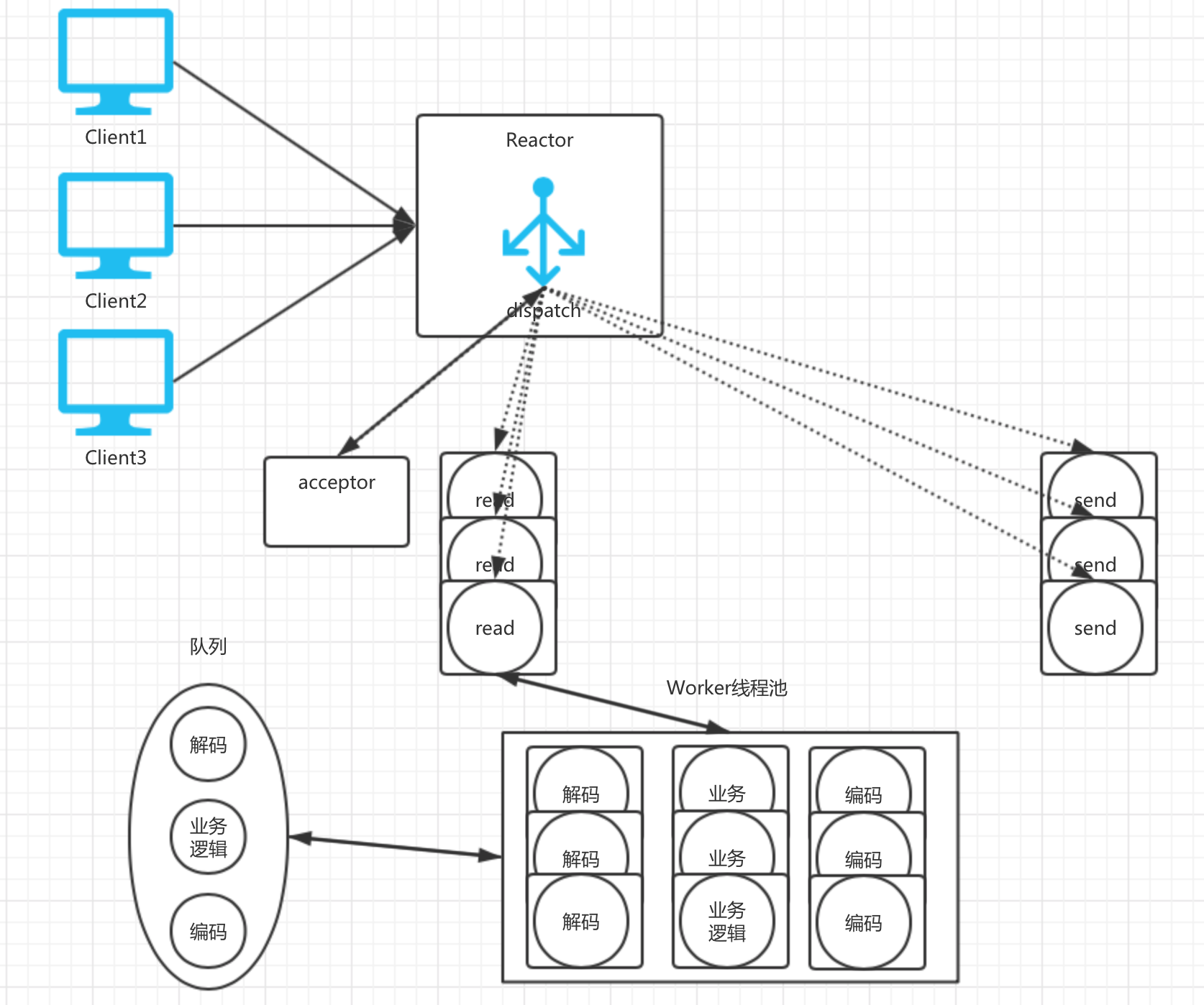
Andler with Thread Pool
class Handler implements Runnable { // Using thread pools in util.concurrent static PooledExecutor pool = new PooledExecutor(...); static final int PROCESSING = 3; // ... synchronized void read() { // ... socket.read(input); if (inputIsComplete()) { state = PROCESSING; pool.execute(new Processer()); } } synchronized void processAndHandOff() { process(); state = SENDING; // or rebind attachment sk.interest(SelectionKey.OP_WRITE); } class Processer implements Runnable { public void run() { processAndHandOff(); } } }
How to invoke a task
-
Chain transfer
>Each task is responsible for invoking the next task, which is usually the most efficient but prone to problems
-
Distributor callback to each handler
>By setting state, binding objects, etc., variants of GoF Mediator mode
-
queue
>As in the example above, data in buffer s is passed through a queue
-
Future
>The caller gets the execution results of each task through the join or wait/notify methods
Using PooledExecutor
- Schedule worker thread
- Main method: execute(Runnable r)
-
There are the following control parameters
- Queue type
- Maximum Threads
- Minimum Threads
- "Warm" versus on-demand threads
-
Automatically reclaim idle threads
>Create a new thread when needed
-
Multiple strategies for task saturation
>Blocking, discarding, producer-runs, etc.
Multiple Reactor Threads
-
Use Reactor pool
- Adapt CPU and IO rates
-
Static or dynamic creation
>Each reactor has its own Selector, Thread, Distribution Loop
- Master acceptor distributed to other reactors
>
Selector[] selectors; int next = 0; class Acceptor { // ... public synchronized void run() { ... Socket connection = serverSocket.accept(); if (connection != null) new Handler(selectors[next], connection); if (++next == selectors.length) next = 0; } }
Multiple Reactor Example
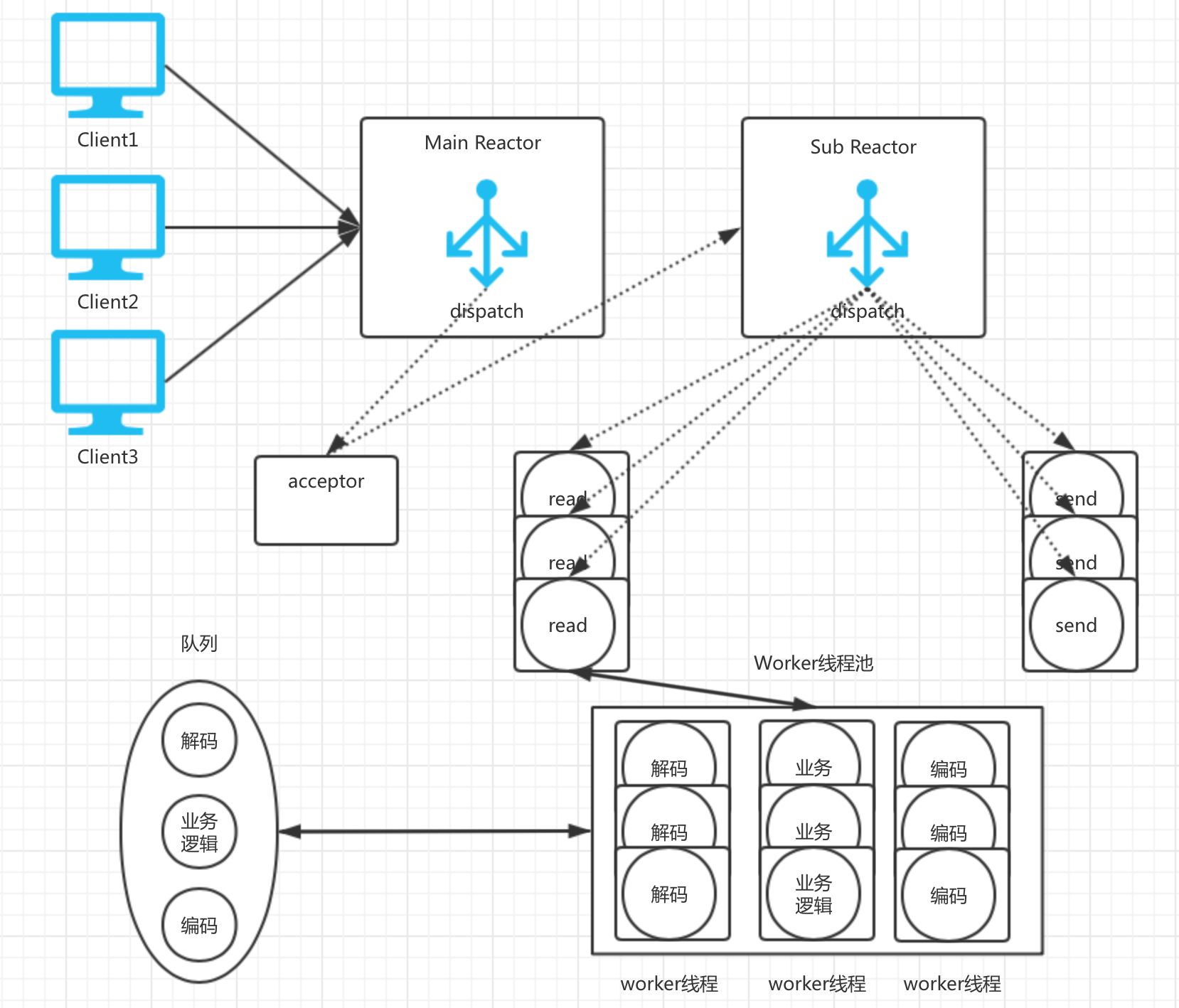
Other java.nio features
-
Each Reactor contains multiple Selector s
>Be careful about synchronization issues when binding different handler s to different IO events
-
file transfer
>Automatic file transfer: file-to-net or net-to-file replication
-
Memory Mapping File
>Access files through buffers
-
Direct access buffer
>Sometimes zero copy can be achieved
> But have setup and finalization overhead
>Ideal for long-connection applications
Extend Network Connections
-
Receive multiple requests at the same time
>Client Connections
>Client sends a series of messages/requests
>Client Disconnect
-
For instance
>Database Transaction Monitor
>Multiplayer online games, chat rooms, etc.
-
Extend the underlying network model above
>Keep many relatively long-lived clients alive
>Track clients, keep session state (including discards)
>Distributed services, across multiple hosts
API Overview
- Buffer
-
ByteBuffer
> (CharBuffer, LongBuffer, etc.)
- Channel
- SelectableChannel
- SocketChannel
- ServerSocketChannel
- FileChannel
- Selector
- SelectionKey
Buffer
abstract class Buffer { int capacity(); int position(); Buffer position(int newPosition); int limit(); Buffer limit(int newLimit); Buffer mark(); Buffer reset(); Buffer clear(); Buffer flip(); Buffer rewind(); int remaining(); boolean hasRemaining(); boolean isReadOnly(); }

ByteBuffer
abstract class ByteBuffer extends Buffer { static ByteBuffer allocateDirect(int capacity); static ByteBuffer allocate(int capacity); static ByteBuffer wrap(byte[] src, int offset, int len); static ByteBuffer wrap(byte[] src); boolean isDirect(); ByteOrder order(); ByteBuffer order(ByteOrder bo); ByteBuffer slice(); ByteBuffer duplicate(); ByteBuffer compact(); ByteBuffer asReadOnlyBuffer(); byte get(); byte get(int index); ByteBuffer get(byte[] dst, int offset, int length); ByteBuffer get(byte[] dst); ByteBuffer put(byte b); ByteBuffer put(int index, byte b); ByteBuffer put(byte[] src, int offset, int length); ByteBuffer put(ByteBuffer src); ByteBuffer put(byte[] src); char getChar(); char getChar(int index); ByteBuffer putChar(char value); ByteBuffer putChar(int index, char value); CharBuffer asCharBuffer(); short getShort(); short getShort(int index); ByteBuffer putShort(short value); ByteBuffer putShort(int index, short value); ShortBuffer asShortBuffer(); int getInt(); int getInt(int index); ByteBuffer putInt(int value); ByteBuffer putInt(int index, int value); IntBuffer asIntBuffer(); long getLong(); long getLong(int index); ByteBuffer putLong(long value); ByteBuffer putLong(int index, long value); LongBuffer asLongBuffer(); float getFloat(); float getFloat(int index); ByteBuffer putFloat(float value); ByteBuffer putFloat(int index, float value); FloatBuffer asFloatBuffer(); double getDouble(); double getDouble(int index); ByteBuffer putDouble(double value); ByteBuffer putDouble(int index, double value); DoubleBuffer asDoubleBuffer(); }
Channel
interface Channel { boolean isOpen(); void close() throws IOException; } interface ReadableByteChannel extends Channel { int read(ByteBuffer dst) throws IOException; } interface WritableByteChannel extends Channel { int write(ByteBuffer src) throws IOException; } interface ScatteringByteChannel extends ReadableByteChannel { int read(ByteBuffer[] dsts, int offset, int length) throws IOException; int read(ByteBuffer[] dsts) throws IOException; } interface GatheringByteChannel extends WritableByteChannel { int write(ByteBuffer[] srcs, int offset, int length) throws IOException; int write(ByteBuffer[] srcs) throws IOException; }
SelectableChannel
abstract class SelectableChannel implements Channel { int validOps(); boolean isRegistered(); SelectionKey keyFor(Selector sel); SelectionKey register(Selector sel, int ops) throws ClosedChannelException; void configureBlocking(boolean block) throws IOException; boolean isBlocking(); Object blockingLock(); }
SocketChannel
abstract class SocketChannel implements ByteChannel ... { static SocketChannel open() throws IOException; Socket socket(); int validOps(); boolean isConnected(); boolean isConnectionPending(); boolean isInputOpen(); boolean isOutputOpen(); boolean connect(SocketAddress remote) throws IOException; boolean finishConnect() throws IOException; void shutdownInput() throws IOException; void shutdownOutput() throws IOException; int read(ByteBuffer dst) throws IOException; int read(ByteBuffer[] dsts, int offset, int length) throws IOException; int read(ByteBuffer[] dsts) throws IOException; int write(ByteBuffer src) throws IOException; int write(ByteBuffer[] srcs, int offset, int length) throws IOException; int write(ByteBuffer[] srcs) throws IOException; }
ServerSocketChannel
abstract class ServerSocketChannel extends ... { static ServerSocketChannel open() throws IOException; int validOps(); ServerSocket socket(); SocketChannel accept() throws IOException; }
FileChannel
abstract class FileChannel implements ... { int read(ByteBuffer dst); int read(ByteBuffer dst, long position); int read(ByteBuffer[] dsts, int offset, int length); int read(ByteBuffer[] dsts); int write(ByteBuffer src); int write(ByteBuffer src, long position); int write(ByteBuffer[] srcs, int offset, int length); int write(ByteBuffer[] srcs); long position(); void position(long newPosition); long size(); void truncate(long size); void force(boolean flushMetaDataToo); int transferTo(long position, int count, WritableByteChannel dst); int transferFrom(ReadableByteChannel src, long position, int count); FileLock lock(long position, long size, boolean shared); FileLock lock(); FileLock tryLock(long pos, long size, boolean shared); FileLock tryLock(); static final int MAP_RO, MAP_RW, MAP_COW; MappedByteBuffer map(int mode, long position, int size); } NOTE: All methods are thrown IOException
Selector
abstract class Selector { static Selector open() throws IOException; Set keys(); Set selectedKeys(); int selectNow() throws IOException; int select(long timeout) throws IOException; int select() throws IOException; void wakeup(); void close() throws IOException; }
SelectionKey
abstract class SelectionKey { static final int OP_READ, OP_WRITE, OP_CONNECT, OP_ACCEPT; SelectableChannel channel(); Selector selector(); boolean isValid(); void cancel(); int interestOps(); void interestOps(int ops); int readyOps(); boolean isReadable(); boolean isWritable(); boolean isConnectable(); boolean isAcceptable(); Object attach(Object ob); Object attachment(); }